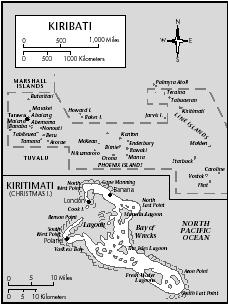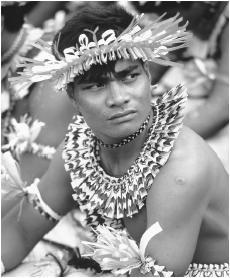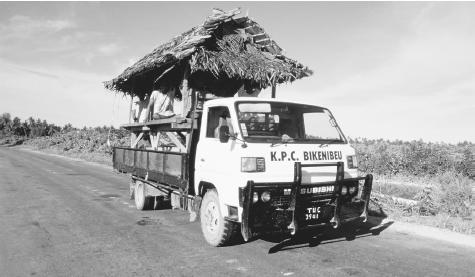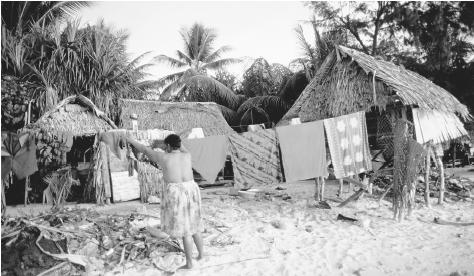Kiribati
Culture Name
I-Kiribati or kaini Kiribati. "Kiribati" is a transliteration of "Gilberts," the British colonial name for part of the Gilbert and Ellice Islands Colony.
Alternative Names
The Kiribati name for the Gilbert Islands is Tungaru, and the archipelago's inhabitants sometimes refer to themselves as I-Tungaru. Island of origin is an important aspect of identification that predates colonialism, and I-Kiribati differentiate themselves by birthplace.
Orientation
Identification. Kiribati is located at the interface of the Micronesian and Polynesian cultural areas and is generally considered Micronesian. The over-whelming majority of the population is I-Kiribati, with very small minorities (less than 2 percent) of Tuvaluans and I-Matang (Westerners).
Location and Geography. The country consists of 33 islands in three primary groups—the western Tungaru chain (sixteen islands), the Phoenix Islands (eight islands), and the Line Islands (eight of the ten islands in the chain)—plus Banaba (Ocean Island) at the western edge of the nation. Ocean-rich and land-poor, these equatorial islands are scattered over millions of square kilometers of the central Pacific Ocean, with a total land area of about 284 square miles (736 square kilometers). Kiritimati (Christmas Island) in the northern Line Islands accounts for about 48 percent of this land area. Banaba is a raised limestone island, but the other islands are all coral atolls, and most have lagoons. These atolls rise less than thirteen feet (four meters) above sea level, raising concerns over rising sea levels as a result of global warming. The thin alkaline soils are extremely infertile, and there is no fresh surface water. Mean daily temperatures vary only slightly, averaging approximately 83 degrees Fahrenheit (28 degrees Celsius). The north of the Tungaru chain is wetter, more verdant, and less prone to drought than the south.
Demography. Banaba and the sixteen most westerly islands have been inhabited for over three thousand years by ancestors of the contemporary I-Kiribati. The Phoenix Islands and Line Islands were not permanently inhabited before the twentieth century. Twenty of the islands are permanently settled. The majority of the population (92 percent) lives in the Tungaru chain, with over one-third living on urban South Tarawa.
The population reached 84,000 in 1998, and is growing at a rate of 1.4–1.8 percent per year. Population has been growing rapidly since the early 1900s, and overpopulation is a serious concern of the government. While family-planning methods were introduced in 1968 and are delivered free, fertility remains moderately high and large families are culturally valued. Despite government efforts to maintain and improve life on the outer islands, there has been substantial migration to the capital on South Tarawa. There are several thousand I-Kiribati in other countries, most serving as temporary workers. There is a small migrant community of I-Kiribati in Vanuatu. Most Banabans were resettled on Rabi Island in Fiji, and became Fijian citizens in 1970. However, they retain ownership of land on Banaba and rights of residence and representation in Kiribati.
Linguistic Affiliation. The I-Kiribati language, sometimes referred to as Gilbertese, is a Micronesian language in the Austronesian family and is spoken in a relatively uniform manner throughout the islands. While the language shows considerable borrowing from Polynesia, it is distinct from the language of neighboring Tuvalu and the Marshall Islands. English is the official language and is taught in primary and secondary schools. Many adults on the outer islands speak little English.

Symbolism. Symbols of nationalism are linked centrally to independence. The primary symbol of the republic is the flag, which depicts a frigate bird over an ocean sunrise. Seventeen rays of sunlight represent the sixteen Tungaru islands and Banaba, and three waves represent the Tungaru, Phoenix, and Line island groups. On the flag is the motto te mauri te raoi ao te tabomoa ("Good Health, Peace, and Honor"). The national anthem is Teirake kaini Kiribati ( Stand Up, I-Kiribati ).
History and Ethnic Relations
Emergence of the Nation. In 1892, the Gilbert Islands became a protectorate of Great Britain and were joined with the Ellice Islands protectorate in 1916 to form the Gilbert and Ellice Islands Colony. In that year, Banaba, Fanning Island (Tabuaeran), Washington Island (Teraina), and the Union Islands (Tokelau) became part of the colony, as did Kiritimati in 1919 and most of the Phoenix Islands in 1937.
Despite a centralized colonial government, a schism developed over time between the culturally and linguistically different Gilbert and Ellice Islanders concerning jobs and other political issues. This ultimately resulted in the separation of the Ellice Islands to become Tuvalu in 1978. In contrast to Kiribati, Tuvalu opted for membership in the British Commonwealth. In July 1979, the Gilberts, Banaba, and the Phoenix and Line Islands became the independent Republic of Kiribati.
Several islands in northern and central Kiribati were occupied by the Japanese in World War II, and the Battle of Tarawa in November 1943 was one of the bloodiest of that war. However, there was little ongoing impact from the Japanese occupation.
National Identity. Precolonially, the people of the Tungaru islands formed small, shifting political units, and there was no unified economic or political system or cultural identity. A single national identity emerged only after World War II as a result of colonial policies intended to move the area toward political independence.
Differences between the northern, central, and southern islands of Tungaru, especially in terms of social and political organization, traditions, and group characteristics, are clearly identified by I-Kiribati and underlie national politics. Traditionally, the north had a more complex social organization with a kingship and chiefly classes compared with the more egalitarian social structure of the south. Currently the north and central islands are seen as more progressive than the south, which is more politically and socially conservative.
Ethnic Relations. I-Kiribati can be considered culturally and ethnically homogeneous, with a shared genetic history, cultural traditions, values, historical experience, and language. I-Kiribati distinguish themselves from neighboring island groups and see the greatest conceptual divide between themselves and I-Matang ("Westerners"). The culture and language of Banaba are basically I-Kiribati. The primary issue in Banaban independence movements has been the distribution of phosphate revenues, not cultural differences.
Urbanism, Architecture, and the Use of Space
Rural houses usually are built of traditional materials and are open-sided rectangular structures with thatched roofs and raised floors. In towns, more houses are built with imported materials such as concrete block and corrugated iron. The most symbolically important structure is the rectangular, open-sided maneaba (meeting house), which may be owned by a family, church community, or village. The maneaba functions as a central place for formal

Food and Economy
Food in Daily Life. Fish and marine resources are a primary food source, as the ecological nature of atolls mean that only the most hardy plants can grow there. Local crops include coconut, giant swamp taro, breadfruit, pandanus, and a native fig. Coconut is central to the diet and is especially valued for the sweet, vitamin-rich toddy (sap) cut from the flower spathe. Toddy is used as a children's drink or as a base for syrup. It can also be soured into vinegar and fermented into an alcoholic drink. Drunkenness is a widespread problem that is dealt with on some islands by the prohibition of alcohol. Imported goods, especially rice, but also flour, canned butter, and canned fish and meat, are becoming increasingly important in the daily diet.
Food Customs at Ceremonial Occasions. The display and eating of prestige foods is central to all celebrations and banquets. Although imported goods are increasingly available, local foods are more important in feasting, such as crayfish, giant clam, pig, chicken, and giant swamp taro. The most symbolically valued crop is giant swamp taro, which is grown in pits dug into the water lens under each atoll.
Basic Economy. Around 80 percent of the population engages in subsistence agriculture and fishing. The cash economy is limited largely to South Tarawa, where the private sector of the economy is very small and there are few manufacturing enterprises. Independence in 1979 coincided with the end of phosphate mining on Banaba, which in 1978 had accounted for 88 percent of the nation's export earnings. The cash economy has now shifted to dependence on remittances from I-Kiribati employed in phosphate mining on Nauru or working as seamen on foreign-owned merchant ships, as well as foreign aid. Accounting for some 60 percent of the gross domestic product in 1995, aid is received mainly from Japan, Australia, New Zealand, South Korea, and the European Union. The government has determined that there is potential for the development of tourism. However, economic development is constrained by a shortage of skilled workers, weak infrastructure, and geographic remoteness.
Land Tenure and Property. Access to and ownership of land underlie and cement social relations. A vital unit in I-Kiribati society, the utu includes all those people who are linked as kin and share common ownership of land plots. Everyone on an island belongs to several utu; people may inherit the land rights for each utu from either parent. The kainga , or family estate, sits at the heart of each utu, and those who live on the particular kainga of one of their utu have the greatest say in utu affairs and the largest share of produce from the land in that utu. The colonial government attempted to reorganize the land tenure system to encourage the codification of individual land holdings, in part to reduce land disputes. As a result, land transfers are now registered.
Commercial Activities. Marine resources have emerged as the most important natural resource for Kiribati, particularly the licensing of foreign fishing vessels to fish in the two hundred nautical miles of the exclusive economic zone in the waters surrounding the islands. Efforts to develop a competitive local fishing company have been less successful but large stocks of tuna fish remain in Kiribati waters. Copra, fish, and farmed seaweed are major exports.
Trade. The primary imports are food, manufactured goods, vehicles, fuel, and machinery. Most consumer goods are imported from Australia, and the Australian dollar is the unit of currency.
Social Stratification
Classes and Castes. Generally, postcolonial Kiribati can be considered a relatively classless society. A new social class of young leaders is emerging, however, threatening the village-based traditional authority of elders. There are also growing income disparities, and access to higher education is emerging as a key differentiating factor.
Political Life
Government. The boti , or clan, system, which according to oral tradition was imported from Samoa around 1400 C.E. , remained the central focus of social and political life in Tungaru until around 1870. By the time of the establishment of the British protectorate in 1892, the traditional boti system had largely been eradicated, replaced judicially and administratively by a central government station on each island. Another major change came when the colonial administration completely reorganized the land tenure system before the 1930s, taking households that had been dispersed as hamlets in the bush and lining them up in villages along a central thoroughfare. At that time, control over village and family activities started to move to the heads of families. In 1963, the British colonial government abolished the kingship ( uea ) system that was part of the traditional political structure of the northern islands. The council of elders ( unimane ) that historically included all the male senior family heads is now responsible for overseeing village and island affairs. Local government consists of statutory island councils with elected members and limited administrative and financial powers and government-appointed administrators.
The government consists of a Maneaba ni Maungatabu , or parliament, which is unicameral. The Beretitenti , or president, is elected by popular vote every four years and is both head of government and chief of state. There is no tradition of formal political parties, although there are loosely structured political parties. There is universal suffrage at age 18.
Leadership and Political Officials. The council of elders in each community continues to be an effective local political force. The village household is the most important unit, and within it the most important person is the oldest male.
Social Problems and Control. The judicial branch of the government includes a court of appeals and a high court, as well as a magistrate's court on each inhabited island. The jurisdiction of the magistrates' courts is unlimited in land matters but limited in criminal and civil cases. There are small police forces on all the islands. Emerging substantial problems include embezzlement (often connected with the practice of bubuti , or requests by kin that cannot be refused), robbery, sexual coercion, and child and domestic abuse, often linked to alcohol use.
Military Activity. There is no standing army. Kiribati has shown some assertiveness in its foreign relations, for example, in the 1986 fishing rights treaty that was negotiated with the Soviet Union despite strong opposition from the United States.
Nongovernmental Organizations and Other Associations
Nongovernmental organizations (NGO) include the Catholic and Protestant women's organizations and the Scouting Association and Guiding Association. An NGO of traditional healers was recently formed. Australian, British, Japanese, and American volunteer organizations are active in Kiribati.
Gender Roles and Statuses
Division of Labor by Gender. Labor is divided by gender, with men fishing and collecting toddy and doing heavy construction tasks, while women handle child care and cook and keep house; both genders cultivate crops. While women may fish and often collect shellfish in the lagoon, only men may collect toddy. There is a clear status ranking in each household, which is usually headed by the oldest male unless he is too elderly to be active. The control of domestic activities lies with a senior married woman.
The Relative Status of Women and Men. While Kiribati society is currently egalitarian, democratic, and respectful of human rights, in the traditional culture women occupy a subordinate role. Job opportunities for women are limited, and there is no

Marriage, Family, and Kinship
Marriage. Although historically polygamy was practiced, the marriage system is now monogamous. Arranged marriages remain common, especially in rural areas. "Love matches" and elopements have become more common and are tolerated by most families. Virginity tests of the bride remain valued despite criticism by churches. Marriage is almost universal, and divorce is unpopular and uncommon.
Domestic Unit. The household is commonly based on a single nuclear family and may include aging parents and adoptive kin. Patrilocal residence remains common in rural areas, with married women moving to live on the husband's kainga .
Kin Groups. The main kinship units are mwenga ("household"), utu ("related family"), and kainga. Membership in mwenga is determined by residence, in utu by kin relations, and in kainga by common property holding and descent from a common ancestor. Inheritance of property and kinship are traced through both the mother's and the father's families. Adoption is widely practiced, especially between close kin.
Socialization
Infant Care. In this pro-natal society, infants are showered with attention and care by both parents and by the extended family. In the first few months after a birth, the mother stays in the house with the baby, and breast-feeding on demand is standard until at least six months of age. Kiribati has one of the highest infant death rates in the world as a result of diarrheal disease and respiratory infection.
Child Rearing and Education. After infancy, care by siblings, especially sisters, is very common, even by siblings as young as eight years. Children are indulged until they are about four years old, after which they become subject to strict parental and kin authority reinforced by corporal punishment. Crying and emotional outbreaks are not tolerated, and a good child is obedient, helpful, and respectful. By age eight or nine, children are expected to start helping around the house.

Schooling is compulsory for children from age six. Approximately 20 percent of primary students go on to receive secondary education. Education is highly valued by parents as a means of increasing their children's wage-earning abilities.
Higher Education. Higher education is expanding and increasingly valued. Kiribati participates with eleven other Pacific Island countries in funding the University of the South Pacific with its main campus in Suva, Fiji. Technical education is available in South Tarawa at the Teacher's Training College, Tarawa Technical Institute, and the Marine Training Centre.
Etiquette
The most important aspect of etiquette for locals and guests involves behavior in the maneaba , where there are appropriate places and ways to sit and interact. In all aspects of life, humility and humbleness are admired. Direct eye contact is uncommon, and it is inappropriate to look directly at one of higher status or cut between the gaze of talking individuals. Touching of heads is considered extremely intimate, and the top of the head is a taboo area. Modest dress is important for women, and cleanliness of the body and clothing is valued.
Religion
Religious Beliefs. According to I-Kiribati mythology, the giant spider Nareau was the creator, followed by spirits ( anti ), half spirits, half humans, and finally humans. The anti were the most important figures in I-Kiribati worship before Christian missionaries arrived, and they remain respected in everyday life.
Conversion activity began in 1852 with the arrival of Protestant missionaries. There was a rivalry between the Catholic and Protestant missions, resulting in deep-seated animosities that remain as an undercurrent in national and island politics. Just over half of all I-Kiribati are Catholic, almost half are Protestant, and the remainder are Seventh-Day Adventist, Baha'i, and members of the Church of God and the Church of Latter-Day Saints.
Medicine and Health Care
Life expectancy is low, and the most common causes of adult death are infectious diseases, including tuberculosis. Liver cancer is a common cause of male death, exacerbated by widespread infection with hepatitis B and heavy alcohol use. There have been several cases of AIDS. Traffic-related accidents are increasing.
While a new central hospital was completed in Tarawa in 1992 and the Ministry of Health and Family Planning provides free medical care in most villages, medical supplies and services are not always available. A pluralistic system of traditional herbal and massage treatments is maintained alongside biomedical services, and many women give birth at home. Healing traditions are passed on as special knowledge within families.
Secular Celebrations
The most important holiday is the annual celebration of independence on 12 July, which includes sports competitions, parades, and feasts. Other national holidays include New Year's Day, Easter, Christmas, and Youth Day (4 August).
Bibliography
Brewis, Alexandra. Lives on the Line: Women and Ecology on a Pacific Atoll , 1996.
Grimble, Arthur Francis and H. E. Maude, eds. Tungaru Traditions: Writings on the Atoll Culture of the Gilbert Islands , 1989.
Macdonald, Barrie. Cinderellas of the Empire: Toward a History of Kiribati and Tuvalu , 1982.
Mason, Leonard, ed. Kiribati: A Changing Atoll Culture , 1984.
Talu et al. Kiribati: Aspects of History , 1979.
Van Trease, Howard, ed. Atoll Politics: The Republic of Kiribati , 1993.
—A LEXANDRA B REWIS AND S ANDRA C RISMON
i was wondering what i could take to school to show something about Kiribati. something like a fruit. something i could get easily. if you ave any ideas; please let me know. (: it would be greatly appreciated. ((:
Good-bye(:
Kiribati is a great place for nature lovers.
I ask this as part of some research that i am carrying out.
#okaaythankyou. lol
I often think about visiting the country where she spent all her adult life.
But this is actually interesting to me.
Hope to hear from you.
Te Mauri Te Raoi Te Tabomoa
I could have surfed this site earlier! I had submitted my assignment but I could have used some information from here! Anyway, I wish to say that this site is one of the useful resources people could use for research work and projects.
I will let the others know about this webpage.
IT
i love you all, i love my home country(kiribati)
hope to see you again
Thank you
Looking forward to hearing from you soon.
Great Thanks for this
God Blesss all of us in everything we do for the future.
Thank you so much and you have done a great job in preserving the very interesting history of our beautifl country kiribati.
Keep up work good work.
thanks for the website
thanks again and appreciation your contribution for your creation.
Thanks God for giving me the opportunity to read this website
Wish you my home Island the best and the peaceful place to live
Te Mauri, Te Raoi, and Te Tabomoa upon you all.
Love you all.
Bless U
E rangi rabwa
thank you and I'm looking forward to hear from you.
your help is appreciated.
bye
I met the local policeman and the priest who were warm and friendly to which i spent time talking.
I was lucky enough to arrive once on Christmas Day on the island and went ashore dress as a tropical father Christmas.i recall the local people sat in a circle singing their folk songs throughout the day.In my spare time I would walk to the lagoon and spend the afternoon on the beach and relaxing i have many photos of my visits and recall how the people of Kiribati made me welcome to which i was so privliege to meet and share some wonderful memories.
by the way..doesn't tungaru mean 16 islands...so historically, banaba was not part of tungaru
but than...I stand to be corrected
Kam na bane n tekeraoi
Ara bau te mauri te raoi ao te tabomoa
Thank you so much and you have done a great job in preserving the very interesting history of our beautiful country Kiribati.
Thanx
I love you all and especially our beloved country
ami bau Te Mauri Teraoi Te tabomoa
Thanks
I'd love to visit and, may be, spend a considerable length of time among the friendly people.
My only suggestion is the addition of more photographs of people and places, in color.
Thank you for the wonderful job.
all the best
Tons of thanks for the Good work on the history of our beloved country Kiribati
Thanks again for the uploading and really appreciate it.
I find this web is very of much great assistance and helpful to I-Kiribati Students
and those who are looking for their information for their assignments and for further studies.
I really appreciate and convey my great sincere thanks
Thanks a lot
I thank all my fellow friends who have put their comment in this website, we all proud of our wonderful country KIRIBATI.
I am thankful for the ones who have put this article in this website as I think that many people will see and know more about our lovely island KIRIBATI
With many thanks
MBATT FAMILY